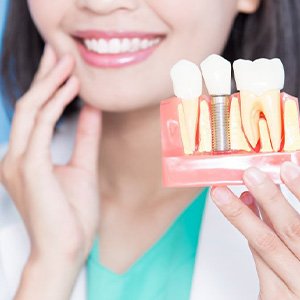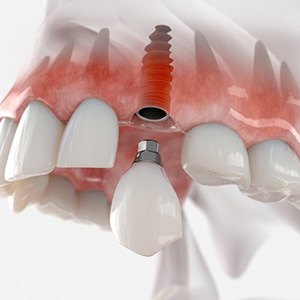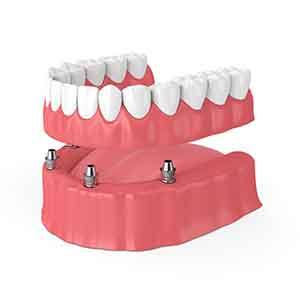Dental Implants Centennial
A Modern Way to Restore Your Smile
Are you looking for the best solution for replacing missing teeth? After all, high quality restorations tend to do well; you can trust them to deliver great results. So, give some serious thought to dental implants. These implant posts are now considered the gold standard of tooth replacement. Dental implants in Centennial may be the answer to getting the smile you desire. Simply keep reading or book a dental consultation today!
Why Choose Shroff Dental Arts for Dental Implants?
- Natural-Looking Porcelain Dental Restorations
- Gentle & Caring Dental Team
- Treatment Planning with Digital Impression Scanner
What are Dental Implants?

Dental implants are small titanium posts that act as substitute tooth roots that replace missing teeth. They don’t operate as dentures and dental bridges do. Instead of sitting over your gums, they’re carefully placed within the bone. Their titanium material ensures they fuse with your jaw. From there, the fused implants will become permanent parts of your mouth. They’ll then be ready to receive a final restoration – a crown, bridge, or denture.
The 4-Step Dental Implant Process

Implant work is a complex and time-sensitive process, and our team will need to create the proper treatment plan to ensure successful results. During your consultation, our team will thoroughly discuss the procedure so that you know exactly what to expect before and after. Until then, here are the four major steps of the dental implant process.
Initial Dental Implant Consultation

You and Dr. Shroff will first discuss your desire for implant treatment. In particular, this consultation will assess your smile goals, oral health, and more. Our dental team will later review your feedback to learn whether implants suit you. We will also need to verify that you’re completely free of any underlying complications, such as gum disease or tooth decay. If you do have any oral health problems, our team will need to resolve these before moving forward with your procedure. After confirming that your oral health is in great shape, we can resume the process.
Dental Implant Surgery

Our dental team will refer you to an outside specialist who can ensure great results with your dental implants. In most cases, your appointment will begin with them completely numbing your mouth with a local anesthetic so that you don’t feel any pain or discomfort. They might even provide sedation dentistry to further relax your body, allowing you to have a more stress-free experience. The specialist will then make an incision in the gums to reach your jawbone, place your dental implants in their preplanned angles and locations, and then suture your gums closed so that the area can heal.
Dental Implant Osseointegration & Abutment

After surgery, your implants will fuse with your jaw’s bone tissue through a process known as osseointegration. This will take about 3-6 months and set the foundation for your new teeth. Once osseointegration is done, you will return to our office so that Dr. Shroff can place your abutments (i.e., metal connectors that hold your implants’ final restoration). You’ll then be sent home to allow your gums to heal.
Delivery of Dental Implant Restoration(s)

Finally, you’ll return to our office for the final restoration when your implants are fully integrated. Your new tooth will be a crown, bridge, or denture, and we’ll want to make sure that your bite is correct before sending you on your way. Once we’ve confirmed that you’re satisfied with your results, you’ll be free to go out and show off your newly rebuilt pearly whites!
Benefits of Dental Implants

More than half a million dental implants are placed annually, so they are quicky becoming one of the most popular ways to replace lost teeth. Because of the specialized process by which they are placed in the jawbone, these amazing prosthetic devices can deliver a range of amazing benefits that traditional restorations cannot match. Here’s a quick overview of how dental implants from Shroff Dental Arts can vastly enhance your health, confidence, and quality of life.
Day-to-Day Benefits

Dental implants can improve a patient’s day-to-day life in ways like:
- Allowing them to enjoy a diverse diet of tasty foods with interesting textures. While traditional restorations often have difficulty handling tougher and harder fare, dental implants can allow you to indulge in juicy steaks, snappy raw fruits and veggies, and crunchy seeds and nuts.
- Only requiring the same oral hygiene measures as real teeth, which means patients can forgo the elaborate and time-consuming nightly cleaning rituals required by traditional dentures.
- Restoring the patient’s confidence in their teeth, which can make them much more eager to engage socially and smile proudly at events like family get-togethers, barbeques, weddings, and graduations.
Health Benefits

Dental implants can also help a patient maintain their oral and overall health in ways such as:
- Making it easy to enjoy a varied diet that includes all the nutritious foods the body needs to stay healthy and strong.
- Improving chewing ability, which can prevent issues like malnutrition and indigestion.
- Stimulating the jaw during the chewing process to give it the exercise it needs to maintain its structure. This can prevent oral health issues like jawbone recession, dental misalignments, uneven enamel wear, hygiene difficulties, and further tooth loss.
- Enhancing a patient’s confidence to reduce their risk of experiencing feelings like sadness, isolation, and depression.
Long-Term Benefits

Dental implants can also deliver some incredible benefits for your pocketbook over the long term. These include:
- Boasting a 95% success rate even ten years after being placed, which makes them a sound investment in your smile, confidence, and oral health.
- Lasting for several decades or possibly a lifetime if they receive excellent care, which can potentially save you thousands of dollars that would be spent on periodic replacements for traditional dental bridges and dentures.
- Smiling frequently makes it easier to earn trust, build rapport, close sales, broadcast confidence, and make an excellent first impression. This may help a patient distinguish themselves from the competition when they are interviewing for a new job or being considered for a lucrative promotion.
Who Dental Implants Can Help

Dental implants are a versatile treatment that can help patients experiencing nearly any type of tooth loss regain their smile. Whether you’re missing one, several, or an entire row of teeth, implants can act as a foundation for a variety of dental restorations. During your initial consultation, our Centennial dental team can help you determine whether dental implants are a good option for you. Of course, if you want to learn more on the topic in the meantime, you can read on as well!
Who Is a Good Candidate for Dental Implants?

As we mentioned above, dental implants are quite versatile. That said, not every patient may be a good candidate for this procedure. Typically, those who can proceed with dental implant placement have adequate jawbone density, good oral health, good overall health, and a willingness to break bad habits, like smoking.
Ultimately, if you’re interested in rebuilding your smile with dental implants in Centennial, the best thing to do is take the next step: schedule a consultation. That way, we can review your dental history, learn about any medical conditions you have, and determine if dental implants are the best tooth-replacement solution for you.
Missing One Tooth

Previously, traditional bridges were the primary solution. Now, there is another option: a single dental implant. This type of restoration allows us to replace both the root and crown of the missing tooth, preserving your jawbone and restoring the strength of your bite in the process. Not only that, but the implant is custom-made, which ensures that it looks and feels like the real thing too.
Missing Multiple Teeth

Are you missing multiple teeth in a row? If so, you have several treatment options. The first is replacing each tooth with a single dental implant. The second is replacing several teeth in a row with an implant bridge. One of the many perks of this type of dental implant is that it doesn’t require any of your healthy teeth to be altered. Plus, the implants stimulate your jawbone, helping prevent bone loss and preserve your youthful face shape in the process.
Missing All Teeth

If you are missing all of your teeth, don’t worry – you don’t have to accept that as your new reality. With implant dentures, we can replace an entire arch of teeth and secure the restoration in position with several strategically placed implants. The final result will be a confident smile, a strong bite, and restored oral health. Plus, with the proper care and maintenance (i.e., brushing twice a day, wearing a mouthguard during sports, scheduling a dental checkup every six months), yours can last for several decades!
Understanding the Cost of Dental Implants

Dental implants are the best tooth replacement option out there. Thanks to their ability to replace the roots of the missing teeth, they allow for a wide range of additional benefits that you can’t achieve with dentures or dental bridges. However, many people are hesitant to consider implants because they are worried about their cost. During your consultation with us, we will go over the estimated cost of your treatment in detail so that you don’t run into any surprises. Until then, here are some things to take into account.
Preliminary Treatments & Dental Implant Surgery

In some cases, patients need to undergo preliminary procedures before they are able to qualify for dental implants. This could include services like gum disease treatment, tooth extractions, bone grafting, and sinus lifting. It is important to consider the cost of these procedures if they apply to you. The good news is that the cost of preliminary procedures often receives partial coverage by dental insurance companies.
The Parts of Your Dental implant

There are multiple factors that contribute to the cost of dental implants. Here are some of the most notable ones.
- Number of Dental Implants: The number of teeth that you are missing and where they are located determine the number of dental implants you need. The more implants, the higher the cost.
- Restoration: Dental crowns, bridges, and dentures are all priced differently. Generally, the larger the restoration, the higher the cost.
- Materials: In most cases, dental implants are crafted from surgical titanium. However, they are also sometimes made from zirconia.
- Brand: Just like other products, dental implants come from various many factors. This influences the cost.
How Dental Implants Can Save You Money

It can be tempting to try to save money by choosing a more affordable tooth replacement option, like dentures. Dentures are an ideal solution for many, but they don’t offer the same lifelong benefits as dental implants. Dental implants help you save money in the long run. This is due to you no longer requiring frequent repairs and replacements. You also don’t need to stock up on adhesives and soaking solutions. Dental implants help to prevent future dental issues, meaning that you can avoid some costly restorative treatments later on.
Does My Dental Insurance Cover Dental Implants?

Dental insurance providers don’t usually cover the cost of the dental implants. However, they often cover parts of the final restoration and preliminary procedures. Since every plan is a little bit different, it is best to confirm your coverage with your provider ahead of time. At Shroff Dental Arts, we are proud to welcome a multitude of popular insurance plans. To learn more about your plan and what it covers, reach out to one of our friendly team members for assistance.
Making Dental Implants Affordable

If you don’t have dental insurance, this doesn’t mean that you are completely out of luck. By joining our In-House Dental Saving Plan, you can save on treatments completed at our practice. We are also happy to accept payments through CareCredit – a third-party financing company that can split the cost of your treatment into manageable monthly installments with little to no interest. If you have any questions or need help applying, give us a call!
Maintaining & Caring for Your Dental Implants

Congratulations on your new dental implants! These life-changing prosthetics have the amazing potential to keep your smile strong and healthy for a lifetime. However, that’s only if you take care of them! Failing to protect your prosthetics from damage and infection could cause them to fail or require replacement. Here are a few healthy habits and simple precautions you can take to help you enjoy your newly rebuilt smile for years to come.
Make Oral Hygiene a Priority

Even though your dental implants can’t get cavities like real teeth can, you still need to practice excellent oral hygiene to protect them. Oral health problems like gum disease or a condition called peri-implantitis could cause them to fail. The good news is that caring for your new prosthetics is easier than you might think. In fact, you follow the same hygiene steps you do with your real teeth, including:
- Brush your teeth twice a day.
- Floss daily.
- Visit your dentist twice a year for your regular, biannual exam and cleaning.
Eat a Healthy Diet

One of the best things about dental implants is that you can eat whatever you want with them, including a variety of nutritious, delicious foods. However, be sure to avoid overindulging in anything too hard, sticky, or sugary, as these can be problematic to your prosthetics. Be sure to enjoy a diet rich in foods with calcium and vitamin C to help keep your jawbone strong and gum tissues healthy, too.
Break Bad Habits

Bad habits can cause your new dental implants to break or fail. Thus, be sure to quit smoking, vaping, or chewing tobacco, as these products can all slow your healing process and increase your risk of infection. Furthermore, never use your teeth (real or prosthetic) as tools, and don’t chew on ice or hard objects, as this can easily damage your restorations.
Protect Your Dental Implants

While it’s true that your new dental implants are strong and durable, they’re not indestructible. Thus, be sure to protect them by wearing a sports mouthguard during athletic activities, or a nightguard if you have bruxism (teeth grinding). This will help reduce excessive wear and tear.
Schedule Regular Dental Checkups

Even if you have no remaining natural teeth, it’s important to visit Dr. Shroff every six months for your regular dental checkup and cleanings. This way, he can monitor your dental implants and spot any potential problems as soon as possible.
Dental Implant FAQs
How Successful Are Dental Implants?
There are several noteworthy perks that come with dental implants, including the fact that they have a success rate of over 95%! To help prolong the lifespan of yours, our Centennial dental team will conduct a comprehensive oral exam to ensure you’re a good candidate and provide you with detailed aftercare instructions to help you avoid dental implant failure (i.e., brushing consistently, scheduling a dental checkup twice a year, eating a healthy diet). Of course, we’re always just a phone call away if you have questions too – whether it’s about which toothpaste to use or an abnormal dental symptom you’re experiencing.
What Should I Do if My Implant Feels Loose?
If your dental implant feels loose (or you start to experience any other warning signs of trouble), we strongly recommend scheduling an appointment with us ASAP. That way, Dr. Shroff can take X-rays, examine your dental implant, and assess the health of the surrounding gums to pinpoint the root of the problem. The sooner that happens, the sooner he can alleviate any pain you’re experiencing and restore your healthy, beautiful smile.
Am I Too Old to Get Dental Implants?
Whether you’re 45 or 95, you shouldn’t let your age stop you from scheduling a consultation with us. After all, candidacy for dental implants is determined by factors like overall health, sufficient jawbone density, and willingness to commit to good dental care, not by age. At your consultation, we will review your dental and medical history, conduct a comprehensive oral exam, and learn about your smile goals. From there, we can determine if dental implants are the best tooth-replacement solution for you.
Can I Get Dental Implants If I Smoke?
Smoking won’t automatically disqualify you, but it is something we need to consider since tobacco use can lead to several problems, including delayed healing. At the very least, you will need to quit both leading up to the procedure and in the months afterward. If you’ve had trouble quitting in the past, don’t hesitate to let us know so we can help you prepare!
Do Dental Implants Decay?
No, dental implants do not decay. Of course, that doesn’t mean you no longer have to brush and floss. Quite the opposite since peri-implantitis (a form of gum disease) is one of the leading causes of dental implant failure. So, if you want yours to last, it’s crucial that you implement healthy habits into your routine, like brushing your teeth each morning and evening with a soft-bristled toothbrush and fluoridated toothpaste. It’s also important that you schedule a dental checkup at our office every six months so we can routinely examine the condition of your implant as well as the health of the surrounding teeth and gums.
Can Dental Implants Replace Molars?
Yes, they can! So, if you are missing one molar or all of your molars, dental implants may be the solution you’ve been looking for. The easiest way to find out is by scheduling a consultation with us.

